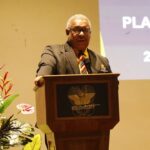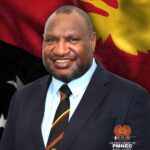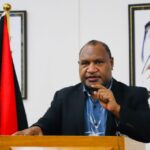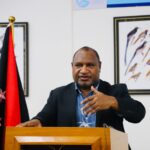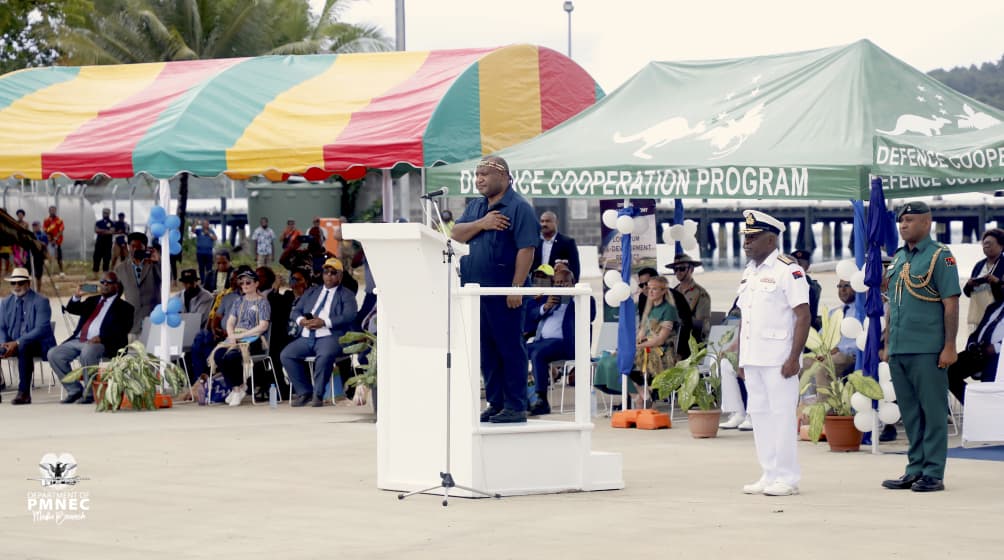Prime Minister Hon. James Marape has described the official opening of the fully restored Lombrum Naval Base in Manus Province as a “historic and strategic leap” in Papua New Guinea’s defence capability, marking one of the most significant military infrastructure investments in the nation’s 50-year history.
Speaking alongside Australia’s Deputy Prime Minister Hon. Richard Marles, the Prime Minister expressed deep gratitude to the Government and people of Australia — particularly Australian taxpayers — for funding the AUD $500 million redevelopment of the facility.
“This is not just a refurbishment; it is a game-changing investment,” Prime Minister Marape said. “Papua New Guinea is a nation blessed with over 3 million square kilometres of sovereign territory — both land and sea. Our maritime zone is rich in fisheries, forestry, energy, and biodiversity, but it is also vulnerable to illegal fishing, illicit trade, drug trafficking, unauthorised migration, and other forms of transnational crime.
“A strong, well-resourced Navy is not optional — it is essential. And the restored Lombrum Naval Base is at the heart of building that strength.”
From Neglect to National Priority
Prime Minister Marape acknowledged that for much of the country’s post-independence history, resource constraints had meant that Lombrum — once a key Allied base during World War II — had seen only piecemeal improvements.
“For over 50 years, we made small interventions here and there, but never the major overhaul that was truly needed,” he said. “This redevelopment changes that. It brings Lombrum into the 21st century with upgraded living quarters, operational facilities, logistics support, and the ability to host modern naval assets.”
The restored base includes:
• Modernised accommodation and mess facilities for PNG Defence Force personnel
• Enhanced docking and maintenance capacity for naval vessels
• Improved operational and command infrastructure
• Upgraded utilities and security systems to meet contemporary military standards
A Vision for a Stronger PNG Defence Force
Prime Minister Marape reaffirmed his government’s target to expand the PNG Defence Force to 10,000 personnel by 2035 — made up of 7,000 regulars and 3,000 reservists — in order to meet the growing security demands of the nation’s vast territory and strategic location in the Pacific.
“This investment is part of a bigger picture,” he said. “We are developing both our air and sea wings so that our Defence Force can operate effectively across all domains. Our goal is to give our men and women in uniform the right tools, the right facilities, and the right conditions to perform at their very best.”
A Pacific Partnership in Action
The Prime Minister also highlighted the importance of bilateral and regional security partnerships, noting that Lombrum would strengthen PNG’s ability to work closely with Australia and other Pacific partners in maintaining stability and security in the region.
“This is a tangible example of the PNG–Australia partnership in action,” he said. “The security of Papua New Guinea is directly linked to the security of the Pacific, and this facility will be central to joint exercises, maritime surveillance, and disaster response operations.”
He emphasised that the investment was not only about defence, but also about safeguarding the livelihoods of coastal communities, ensuring sustainable use of ocean resources, and protecting the nation’s sovereignty.
A Milestone in PNG’s 50th Anniversary Year
The timing of the restoration, Prime Minister Marape noted, was symbolic. “As we celebrate our 50th anniversary of independence, this is a powerful reminder that we must continue to strengthen the foundations of our sovereignty,” he said. “The restored Lombrum Naval Base is a statement to the world that Papua New Guinea is serious about defending its people, resources, and future.”
He concluded with a heartfelt message to the Australian public: “On behalf of the people of Papua New Guinea, I thank the Australian taxpayers for their generosity. Your investment is not just in infrastructure — it is in the security and prosperity of an entire nation and the wider Pacific region.”


